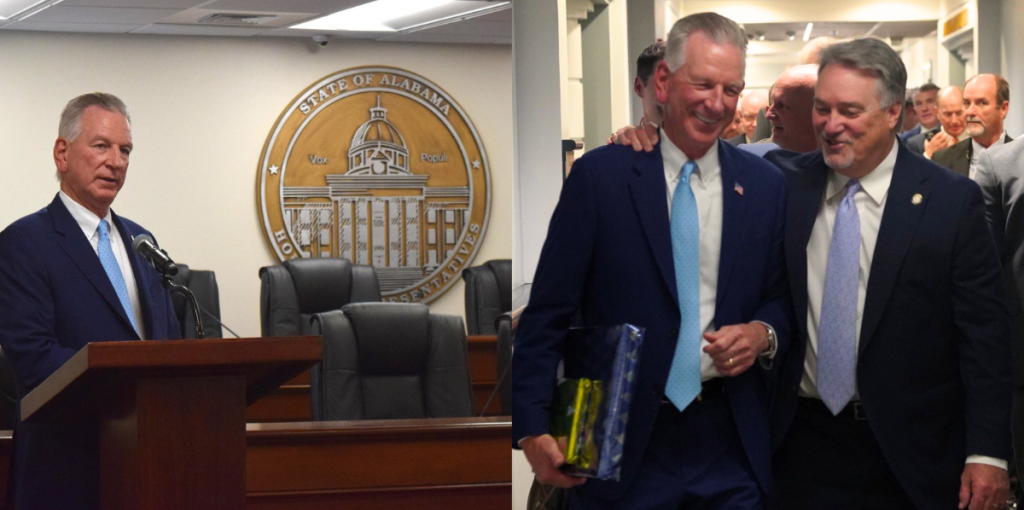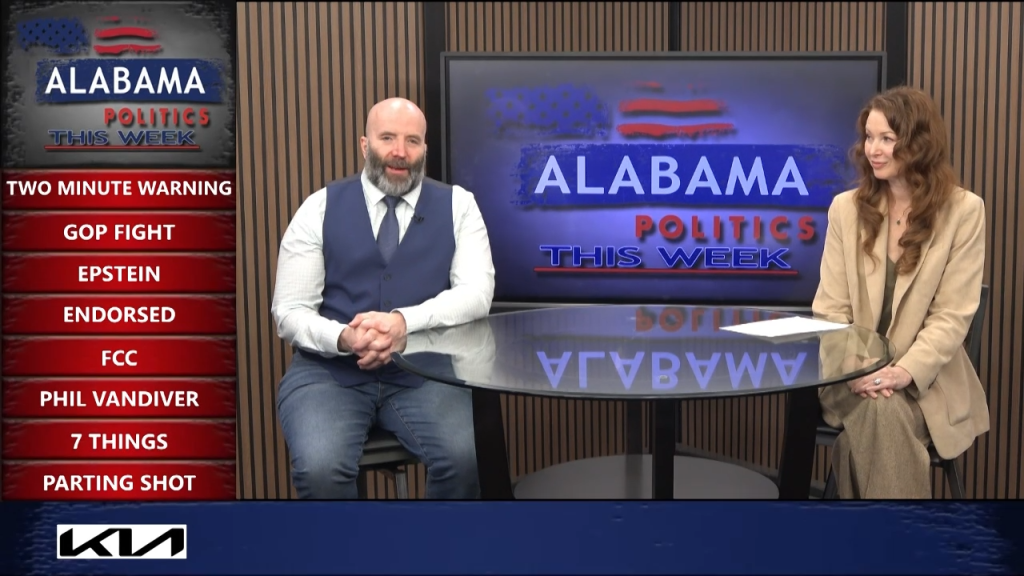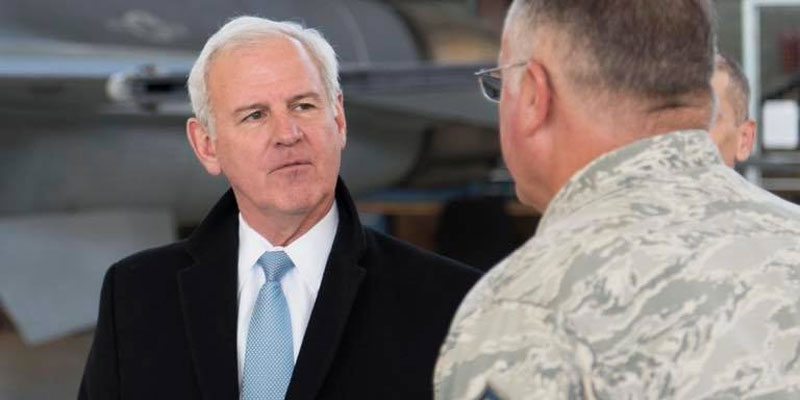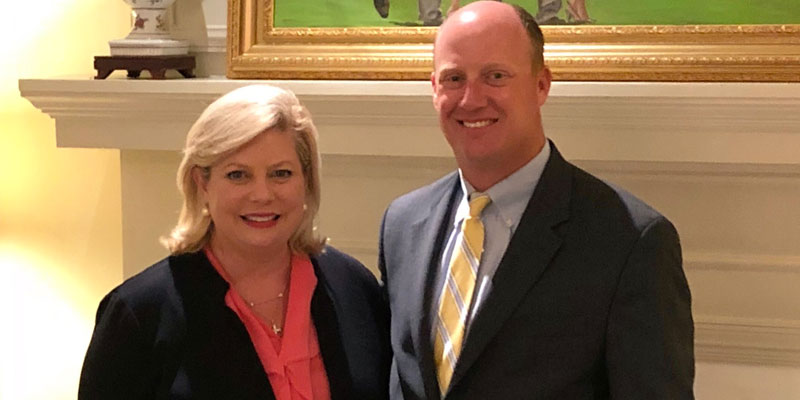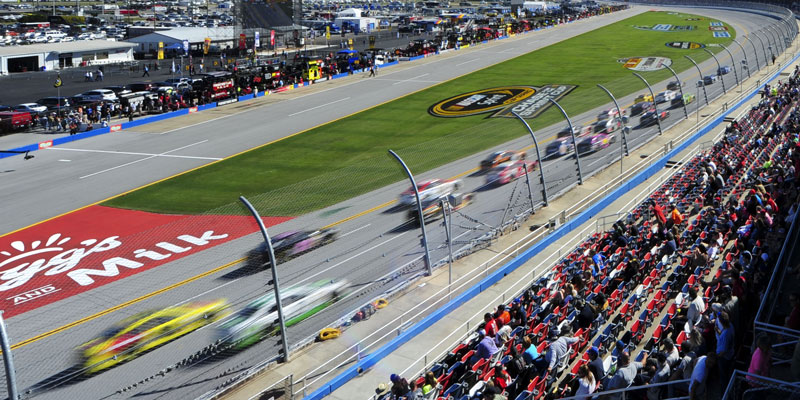Yellowhammer News previewed the 2020 U.S. Senate race three months ago, but things are really taking shape now that Alabama’s midterm election has passed.
However, there has been a “known unknown” thrust into the mix: will Jeff Sessions run to reclaim his former seat? That has become the key dynamic in the race that hopefully will be answered soon.
Yet, as much as that could shake up the Republican primary, there is one thing that has not changed and, in fact, became even clearer to the masses after Tuesday’s general election: Sen. Doug Jones (D-Mountain Brook) will not win a full term of his own, barring another Roy Moore-type debacle.
Who will be the Republican to defeat Jones? Here are the eight most compelling candidates to do just that, broken down by whether Sessions does or does not run.

If Sessions does not run: Ainsworth is on the rise in Alabama politics, and a jump to the United States Senate in 2020 now does not look like too much of a leap. He built solid name identification this year and would have a recency advantage over most of the pack in a primary season expected to kick off within months.
Another advantage Ainsworth has going is age. Alabama could really benefit from someone getting into the Senate who can stay for 30 – 40 years, in the mold of legendary statesman Sen. Richard Shelby (R-Tuscaloosa), and Ainsworth certainly fits the bill.
He knows the issues and seems comfortable talking to Republicans of all stripes. From economic development to immigration and abortion, Ainsworth has a wide-ranging portfolio of topics he is already on the record about. Coupled with his multi-millions in self-funding ability and his family’s ties to top-level federal donor networks, Ainsworth would be a major player if he decided to run. It would be a “free shot” for him considering his term as lieutenant governor will end in 2023, so keep a close eye on this young gun from Marshall County.
If Sessions does run: Ainsworth has a long future ahead of him and would be unlikely to risk his rising stock with a run against the venerable former senator. It would be best to wait for a better opportunity in this scenario.

If Sessions does not run: Someone from the Huntsville area will run for the Senate in a free-for-all field, with Battle being by far the strongest candidate from the area. The mayor has proven that he has a stronghold of votes in and around Madison County. For both fundraising and turnout, Huntsville’s reliance on federal dollars and policies will be a big boost for him.
By staying positive and building name identification in his television advertising against Governor Kay Ivey, Battle fostered good-will amongst some of the Republican Party faithful and built a base of favorability for this future run. However, it’s unclear how Battle will fare in a statewide race in which multiple candidates will be throwing jabs at him, probably all from the right. His social conservative bona fides will come under attack, and pivoting to economic development talking points will not work with the vast majority of Republican primary voters.
There is also speculation he still really does want to be governor and may wait until 2022 to try and do so. If Battle does not run for the Senate in this scenario, look for someone like Rep. Mo Brooks (AL-5) to carry the banner for north Alabama.
If Sessions does run: While Sessions is from south Alabama, his base runs statewide and federal industries in Huntsville have known him as a friend already in the Senate. Battle would stand little chance against Sessions and would be very unlikely to challenge him, as any credible Sessions challenge would have to come from Sessions’ right.

If Sessions does not run: Byrne has been the one potential candidate that has been out working across the state, traveling to different civic meetings, touring economic development sites to lay the groundwork for his campaign and sending press releases out left and right (well, right and right). Now that he won re-election on Tuesday, Byrne confirmed that he is officially exploring a Senate run.
In what is sure to be a crowded primary field, candidates with strong geographic bases like Byrne’s in vote-rich Baldwin and Mobile counties already have a leg-up as they seek to make a primary runoff. Byrne also has experience running statewide, a resulting name I.D. advantage over Alabama’s other seven members of the U.S. House, economic development success stories to tell and proven big-league fundraising ability. He also has over $1.1 million on hand as of October 17, and can continue raising money under his House committee, that can be transferred to an eventual Senate committee.
From his messaging in the past few months, it also looks like Byrne is aware that he needs to prove that he has learned from his 2010 upset defeat and better message to base Republican primary voters because he has been out front on social issues. If Sessions does not run, Byrne has vaulted himself to the front of the pack with his early hard-work.
If Sessions does run: This is a big question. Again, Byrne has been out working, which may scare some other credible candidates off. However, would Sessions put him off? They are both from the Mobile-area, so Byrne’s geographic advantage would be shot. It is unclear if this was his intent, but Byrne also signaled deference to the now-former attorney general after his resignation, saying he expects to meet with him in the “next few weeks.” This would seem to box Byrne in now, with it being expected that Byrne’s respect for Sessions would outweigh his ambition to run for the seat. Byrne is still going to be out working until that meeting, but he would have been better off framing any Sessions meeting as a talk about policy issues or a chat between friends instead of letting it look like a request for permission to run.

If Sessions does not run: Cavanaugh is amongst the most recognizable names in state politics, with the sky-high name identification that normally takes millions of dollars and many years to build. In what would be a relatively crowded field if Sessions sits the race out, a 2020 run would make a lot of sense for Cavanaugh. Her name I.D. alone would see her at or near the top of preliminary polls, and this kind of early success normally has an effect on donors, endorsements and earned-media coverage.
Consider also that Cavanaugh proved herself as a prolific fundraiser this past cycle, raising over $1.6 million in the lieutenant governor’s race and building a strong network of donors and influential supporters. Combined with her strong favorability with the Republican base, proven political savvy and leadership on social conservative issues (she co-chaired the successful effort to pass Amendment Two), she has the balance that most other candidates do not. And, as potentially the only woman in the race, she would stand out from the crowd.
If Sessions does run: Cavanaugh would be extremely unlikely to challenge Sessions, who she greatly respects and considers a friend.

If Sessions does not run: Like Ainsworth, this would be a free shot for Marsh, as his sixth term in the State Senate will not end until 2022, and his prolific self-funding ability is right up there with the best of them, which could give him a significant cash-on-hand head-start on almost all other elected officials on this list. Marsh also has a top-notch fundraising network to add onto his own funds, making him tough to compete with on the air waves.
As evidenced by this television ad he released last month, Marsh does have a compelling story to tell, too – it is one that resonates with Alabamians. Between his entrepreneurial successes and records of public service, Marsh will sell well on the campaign trail and in ads. He still has a long way to go in building the necessary name I.D., yet the silver lining – money and time, two things Marsh has on his side, can accomplish this.
Keep an eye on the major issues expected to come up in the Alabama Legislature in 2019 – infrastructure (probably a gas tax), the lottery and education reform – and how these could affect Marsh’s potential campaign.
If Sessions does run: Do not expect to see Marsh challenge Sessions. He can bide his time waiting on a better opportunity as Pro Tem.

If Sessions does not run: Not much has changed for Palmer since Yellowhammer News’ last preview. While Byrne has been out working and Marsh and Ainsworth impressed with recent television ads, Palmer has been laying low statewide as he works away on Capitol Hill.
This being said, if no other serious candidate from the Birmingham metropolitan area enters the race, Palmer would have the potential to collect a sizable vote from his ruby-red district. As a member of the House Freedom Caucus and given his tenure at the Alabama Policy Institute, he will have significant grassroots and Republican base appeal. Palmer not only knows conservative issues, he knows how to message conservative issues. He will be able to raise money competitively from the Birmingham business community and as a sitting Member of Congress, plus he has around $520,000 currently in his campaign coffer. His challenge will be low name identification outside of his district, and if the last few months are good indicators, being proactive in laying campaign ground work and promoting himself.
If Sessions does run: While Sessions likely clears the field of credible candidates completely or near it, Palmer seems more likely to run under this scenario than Byrne and certainly more so than Marsh (the two other candidates besides Palmer most rumored to be strongly weighing runs). He put out a statement on Sessions’ resignation a day after the fact, and it read like one that was trying a little too hard to not say much.

If Sessions does not run: People close to Roby do not seem to see this in the cards, but it makes a lot of sense. Besides Cavanaugh, she is the only woman with name recognition who could enter the race. Alabamians also tend to elect candidates who have the potential of acquiring and leveraging seniority in the Senate. Having just turned 42 in the last few months, Roby could serve for forty years if elected, matching one of Ainsworth’s strengths.
Assuming Roby would only enter the race if Cavanaugh did not, she could garner a sizable vote in the River Region and the Wiregrass, a Republican stronghold. Committee assignments will change with the new Congress, but Roby will hold some degree of fundraising leverage still and currently boasts a campaign balance of approximately $450,000.
She has almost entirely moved past her infamous opposition to President Donald Trump and could mount a compelling campaign if she wants to. That seems to be the biggest question, though. At her age, this might not be the best cycle to risk losing her House seat.
If Sessions does run: Roby will not run.

While Yellowhammer News has seen credible polling that shows Sessions’ net favorability is now slightly under water, he enjoys nearly universal name recognition in the state, as well as a record of service in the U.S. Senate that Alabama Republicans revered. Time will significantly heal the Trump wounds, and the president may very well publicly give his backing to Sessions in the near future and speed up his favorability recovery. Consider, too, that Sessions has approximately $2.5 million sitting idle in his campaign account.
Regardless, Sessions would clear the field completely or almost so of all credible candidates. Elected officials, party activists and conservative politicos have deep respect for Sessions and his lifetime of service, and many consider him to be a personal friend. Out of deference/respect, it would be hard to imagine a big name challenger to him returning to his seat, if he really wants it. Nominating Sessions would also be a guaranteed win against Doug Jones.
One aspect to ponder is whether Sessions would get his seniority back. Senate rules and recent precedent seem to suggest the answer would be “no,” however Sessions and Leader McConnell go way back, and Sen. Shelby would also probably have a thing or two to say about this in Sessions’ favor.
At the end of the day, this race is frozen for awhile until Sessions makes a decision. Knowing this, he holds a lot of power, and even if he eventually does not run, he could help tilt the race in a specific candidate’s favor by how long he keeps his cards close to the vest.
Sean Ross is a staff writer for Yellowhammer News. You can follow him on Twitter @sean_yhn





